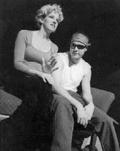THEATER, LIKE MOST of the “high arts,” often comes under attack as elitist. Usually, such accusations couldn’t be further from the truth. Theater artists ache for the popular taste. What fuels the experiments of the avant garde, for example, is more often an attempt to break the deadening formalities of theater and reach a popular audience than an attempt to satisfy the jaded sensibilities of Brie-snarfing aesthetes.
Dirty Little Secrets
Annex Theater, ends September 9
For evidence, consider Jeffrey Jones’ new play Dirty Little Secrets, currently receiving its world premiere at Annex Theater. Although Jones is known for his deconstruction of traditional theater (most famously in his brilliantly jumbled 70 Scenes of Halloween), he’s chosen as the subject for his latest work that most populist of all interests—the lives of the rich and famous.
In a series of interlocking scenes, Jones provides fictional dialogue based upon the lives of a series of popular celebrities. He’s coy about giving the full names of his characters, most probably because of a (reasonable) concern about libel laws, though there’s nothing here that tabloid readers haven’t heard more outrageous versions of, I’ll wager. The play depicts Tommy the rock star and his cosmetically enhanced wife Pam; Michael the (very strange) pop sensation and his quest for a baby—first with his quasi-celebrity wife Lisa-Marie and then with his nurse Debbie; Sherry the escort girl who “dates” presidential adviser Dick; and ailing crooner Frank, whose last days are spent listening to his daughter Nancy arguing with his wife Barbara.
If a common theme unites all of these stories—from the bizarre triangle of Michael and his wife and nurse, to Dick’s attempts to impress his “girlfriend,” to the disintegrating marriage of Tommy and Pam—it’s the quest for human love. However, despite Jones’ claimed interest in showing us the real people behind our tabloid-created preconceptions, very little in his writing is humanizing.
The life of rock star Michael, for example, is shown as impenetrably bizarre. Such questions as how he ever even met Lisa-Marie or what drives him on to have a child never come up. Instead, the playwright is too involved in relishing such oddities as Nurse Debbie’s phone call to Michael’s former wife when she’s pregnant.
AS FOR THE LAST days of the blue-eyed singer Frank, the screaming matches between Barbara and Nancy regarding whether he should be in the hospital or whether the Smithsonian should be called to receive his memorabilia contain an explicit nastiness in which the playwright seems to revel. These alternate with scenes that routinely mistake sentimentality for profundity.
Two of the actors do quite well despite these obstacles, while two do not. Paul Budraitis copes heroically with all the male roles and, as dim-as-phosphorus rocker Tommy and as the dying Frank, actually manages to wrest some life out of Jones’ purposefully clich餠language. Barbi Beckett, both as the cheerful dimwit Pam and the world-wise prostitute Sherry, manages to find some real heart in the midst of a lot of heartlessness. Gabriele Schafer and Cynthia Whalen, however, burdened with roles that require a lot of screaming and often opaque motivation, salvage little from the cartoon world the playwright serves them up.
Both Jones and director Ed Hawkins seem to have fallen into the belief (shared by many overly intelligent people) that if millions of folks pick up a tabloid paper every week, there must be something profound in there that those of us disdainful of checkout-line reading material are missing out on. Maybe so, but all this evening manages to do is bring the gossip, outrageous speculation, and overwrought language onto the stage, while leaving the real people someplace else.








